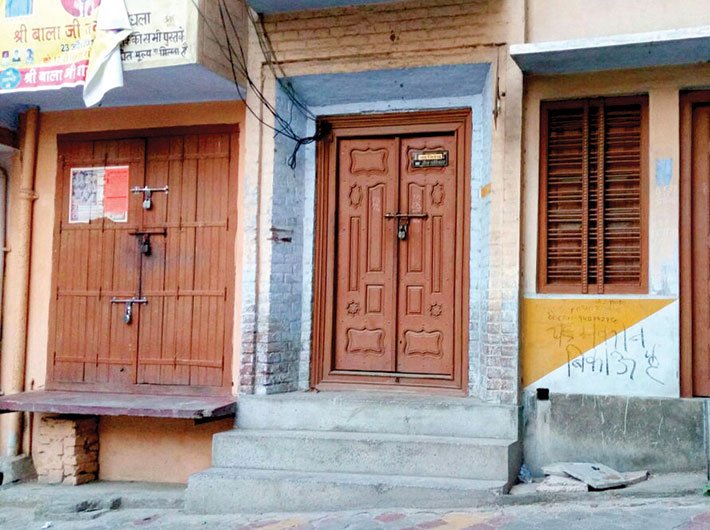The BJP MP’s claim of mass exodus of Hindus from Kairana is nothing but a political ploy ahead of the UP elections
Sir, I want to bring to your notice that neither my family had been harassed in Kandhla town, nor did we leave the place because of any fear. Some mean-minded people are conspiring to vitiate the atmosphere of the town. They wrote on the wall of our house located at Sarvagyan mohalla that ‘the house is up for sale’; and with the help of some local journalists, they even got the picture of my house with ‘for sale’ mark published in newspapers. I request you to identify such elements and take strong action against them in public interest.”
This is an excerpt from a written complaint made by 36-year-old Gaurav Jain to the district magistrate of Shamli, Uttar Pradesh. Gaurav’s family had shifted to Ghaziabad way back in 2010 to start a business. When the Jains were living in Kandhla, Gaurav was known for making efforts to foster communal harmony. Obviously, he was shocked to see the picture of his house alongwith a story about the alleged exodus of Hindus in newspapers. He feels that it was part of a political gameplan aimed at breaking the Hindu-Muslim bonds in western UP.
Interestingly, Gaurav’s father Paras Chand, too, finds his name among those who had ‘fled’ the town. It figured in the second list of 63 people who had allegedly moved out of Kairana and Kandhla. The first list had 346 names from Kairana. While releasing the list, BJP MP Hukum Singh had claimed that these Hindus were forced to leave their homes due to ‘threats’ from a gang belonging to ‘a particular community’. Later, however, he took a u-turn by saying that the migration was not linked to religion but had happened due to the poor law and order situation. The list was released just before the BJP’s national executive meet in Allahabad (June 12-13), where, again, party president Amit Shah raised the issue of ‘Hindu exodus’ from Kairana and blamed it on the UP government. Some party leaders even compared Kairana with Kashmir.
However, investigation by a section of the media revealed several loopholes in the story. Many people named in the list are living in their houses; others, like the Jains, had migrated years ago. The administration too refuted the theory of mass exodus and claimed that only three people had left the town because of threats from goons. In fact, as per an Indian Express report, a team sent by the ruling Samajwadi Party claimed that 160 Muslim families had left Kairana over the last decade.
However, the BJP does not want the controversy to end. It is believed that associate organisations like the Vishwa Hindu Parishad are busy preparing the ‘Hindus’ exodus’ lists for other districts as well. One can easily understand the BJP’s strategy for its Mission UP – winning more than 265 of the 403 Assembly seats in 2017. The party knows that the 2013 Muzaffarnagar riots had helped it win 71 Lok Sabha seats from UP in 2014 Lok sabha polls – its best-ever performance. At that time, thousands of Muslim families were forced out of their homes and villages. However, leaders like Hukum Singh had then never released lists to highlight ‘Muslim exodus’. The Muzaffarnagar riot victims have been slowly settling down in towns like Kairana with large Muslim population. Interestingly, the BJP is also trying to make the Muslim-majority status of towns like Kairana an election issue.
While addressing a rally after the executive meet in Allahabad, prime minister Narendra Modi had said that “development will gain momentum only when seeds of communalism, dynastic rule and corruption are removed”. However, the manner in which the BJP leaders including Shah raised the issue of ‘Hindu exodus’ on the basis of unconfirmed reports, shows that the party is planning to use the Hindutva card to win the battle of UP. Meanwhile, other major political players like the Samajwadi Party and the Bahujan Samaj Party are banking on support of caste groups and Muslims.
Notwithstanding Modi’s slogan of ‘Sabka Saath, Sabka Vikas’, the speeches of party leaders like Yogi Adityanath and Sakshi Maharaj who are MPs, and Ram Shankar Katheria and Sadhvi Niranjan Jyoti, a union minister of state, added to the demonisation of Muslims. The consistent propaganda on ‘love jihad’, ghar wapsi, cow slaughter and beef eating is also part of a well-thought out plan to incite hate against Muslims.
It shows that the BJP no longer believes it can win election in UP on the plank of development. The talk of ‘Hindu exodus’ is reminiscent of the Ram temple movement which had helped BJP gain power, though at the cost of dividing people along religion.
In 2014, the people of Uttar Pradesh, specially the youth, had voted for the BJP in response to Modi’s slogans of ‘change’ and ‘development’. His promise to curb inflation and generate employment had also worked in the BJP’s favour. But after two years, the party has little to show. The common man continues to suffer from price rise and rampant joblessness. He also realises that the Modi government’s claims about employment generation are confined to releasing statistics. Millions have been spent on advertisement campaigns of Swachh Bharat Abhiyan, but not a single city is clean today. In fact, the PM’s constituency, Varanasi, a major tourist hub, is full of garbage though the Varanasi municipal corporation is controlled by the BJP.
As such it is pathetic to see India’s most populous state lag far behind others in development. Besides poor law and order, the state is mired in scams in government-funded welfare schemes. Poverty and drought are forcing people out of their native places. Analysing the sale of train tickets, a CNN-IBN report says that unable to bear the famine, at least 18 lakh people migrated out of Bundelkhand to Delhi in just one year. Sadly, no political party is interested in making it an election issue, probably because it cannot get them votes.
A developed India cannot become a reality without a state like Uttar Pradesh joining the march. It has great potential for growth but lacks visionary leadership. Parties using caste and communal cards can surely form a government but they cannot make India an inclusive society.
feedback@governancenow.com
(The article appears in the July 1-15, 2016 issue)

